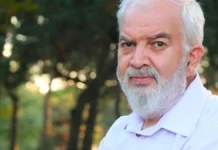Turkish spies have arrested and brought back to Turkey a nephew living in Kenya of Islamic scholar Fethullah Gülen, who is accused by the Turkish government of masterminding a failed coup in Turkey in 2016, Turkish Minute reported, citing the state-run Anadolu news agency reported.
The Gülen movement, inspired by the views of the US-based scholar, strongly denies any involvement in the failed putsch, which sparked a government-led crackdown on the group.
Anadolu reported that Selahattin Gülen was brought back to Turkey by agents from Turkey’s National Intelligence Organization (MİT), quoting unnamed security sources, but did not say which country he was arrested in.
The agency published a photograph of the detainee in handcuffs with a Turkish flag on either side but did not say whether the MİT operation took place with the coordination of the host country.
On May 19 President Recep Tayyip Erdoğan announced in televised remarks that they had recently apprehended an important member of “FETÖ,” a derogatory term coined by the Turkish government to refer to the cleric’s faith-based Gülen movement as a terrorist organization, adding that he would soon announce that person’s identity.
Hours after Erdoğan’s revelation, Selahattin Gülen’s wife Seriyye released a video on YouTube in which she said her husband went missing on May 3 in Kenya, where he has been living for the past seven months.
“I haven’t heard from him [since May 3]. … At this point, I don’t know how, but I think it’s very likely that he was abducted [by people working for the government] and taken to Turkey on May 5,” she said.
Gülen also alleged that her husband was kidnapped solely because he was related to Fethullah Gülen, calling on authorities to find Selahattin Gülen and release him immediately.
Selahattin Gülen’s brother Kemal Gülen, a journalist and TV host who is also in exile, tweeted that his brother was kidnapped in Kenya and forcibly taken to Turkey despite the fact that the Kenyan courts had ruled against his extradition.
Turkish President Recep Tayyip Erdoğan has been targeting followers of the Gülen movement, since the corruption investigations of December 17-25, 2013, which implicated then-Prime Minister Erdoğan, his family members and his inner circle.
Dismissing the investigations as a Gülenist coup and conspiracy against his government, Erdoğan designated the movement as a terrorist organization and began to target its members. He intensified the crackdown on the movement following a coup attempt on July 15, 2016 that he accused Gülen of masterminding.
The incident follows the extraordinary rendition of over 100 people with real or alleged links to the Gülen movement since the coup attempt.
In a joint letter UN rapporteurs accused the Turkish government of engaging in the systematic practice of state-sponsored extraterritorial abductions and forcible returns to Turkey of its nationals from over 30 different countries including Afghanistan, Albania, Azerbaijan, Afghanistan, Cambodia, Gabon, Kosovo, Kazakhstan, Lebanon and Pakistan removed to Turkey.
In a number of cases the UN Working Group on Arbitrary Detention (WGAD) concluded that the arrest, detention and forced transfer to Turkey of Turkish nationals were arbitrary and in violation of international human rights norms and standards.
A recent report by Freedom House on global transnational repression also revealed the intensity, geographic reach and suddenness of the Turkish government’s campaign targeting dissidents abroad, noting that Turkey has become number one among countries that have conducted renditions from host states since 2014.
According to the report, Ankara’s campaign has primarily targeted people affiliated with the Gülen movement, but the government has started applying the same tactics to Kurdish and leftist individuals living abroad.
Some of the extralegal rendition victims in Turkey have spoken out in court after they were found in police custody, recounting the systematic and severe torture they were subjected to during their interrogation by government operatives, who, victims said, waited until their wounds had healed to hand them over to the police.
















[…] the nephew of Gulen who was living in Kenya was abducted by Turkish authorities and sent back to Turkey, according to Anadolu, the state-run news […]